Aquaman (2018)
Jason Momoa, Amber Heard, Willem Dafoe, Patrick Wilson, Dolph Lundgren, Yahya Abdul-Mateen II, Nicole Kidman. Written by David Leslie Johnson-McGoldrick and Will Beall. Directed by James Wan.
 There was a point at which I almost said aloud, “This is completely ridiculous. How in the world am I supposed to believe any of it?”
There was a point at which I almost said aloud, “This is completely ridiculous. How in the world am I supposed to believe any of it?”
Then in the very next second, I had a flash of some of my favorite movies, many of which would be unbelievable in any world outside the worlds created for them, for an audience ready to believe them. The Harry Potter movies, which I love, are in a fantastic world right against the real world. If I could accept the fantasy of Hogwarts, why not of Atlantis?
 This is when my entire movie-watching self simply relaxed. I popped some Junior Mints into my mouth and eased comfortably into a world where a man speaks to fishes and his half-brother rides giant seahorses. Perhaps I’m ready to give The Shape of Water a try, now that I’ve seen and enjoyed Aquaman.
This is when my entire movie-watching self simply relaxed. I popped some Junior Mints into my mouth and eased comfortably into a world where a man speaks to fishes and his half-brother rides giant seahorses. Perhaps I’m ready to give The Shape of Water a try, now that I’ve seen and enjoyed Aquaman.
 It’s a big, dumb, super-enjoyable movie, kind of a refreshing break from the darkness and ponderousness of DC’s recent films. Let Superman have his fortress of solitude and Batman his cave; Aquaman will do fine with a few enormous tankards of beer with his homies in the neighborhood bar.
It’s a big, dumb, super-enjoyable movie, kind of a refreshing break from the darkness and ponderousness of DC’s recent films. Let Superman have his fortress of solitude and Batman his cave; Aquaman will do fine with a few enormous tankards of beer with his homies in the neighborhood bar.
 Arthur Curry (the alterego I didn’t know Aquaman had) is the product of a romance between a lighthouse keeper in Maine and the queen of Atlantis. His half-brother, who sits on the throne in Atlantis, rallies the other undersea kingdoms for a war against the humans of the surface. To intervene, Aquaman must find the trident of his ancestor kings, so he might defeat his brother and claim his place as ruler of the sea.
Arthur Curry (the alterego I didn’t know Aquaman had) is the product of a romance between a lighthouse keeper in Maine and the queen of Atlantis. His half-brother, who sits on the throne in Atlantis, rallies the other undersea kingdoms for a war against the humans of the surface. To intervene, Aquaman must find the trident of his ancestor kings, so he might defeat his brother and claim his place as ruler of the sea.
Aided by Mera, a princess from another sea kingdom, and of course all the creatures of the sea, Aquaman chases the legend of the trident in something of a Temple-of-Doom manner. It’s all rather predictable but getting there is entertaining. The acting is fine, highlighted by Nicole Kidman and Amber Heard. Jason Momoa as the prince of Atlantis is like a better-looking Thor with slightly less acting talent.
It works for me, and it pretty much accomplishes exactly what it intends: brain disengagement and an escape from the sad ruminations of daily living, and who couldn’t use a bit of that?
7/10
70/100

 Happy Christmas is the first film I’ve seen by Joe Swanberg, but this guy gets me, and I want to see more of his work. Starring Anna Kendrick (one of my favorite actresses) and Melanie Lynskey in mostly improvised dialogue, this is a good example of a movie that doesn’t really go anywhere. Yet it goes so many interesting places that I look forward to seeing it several times more.
Happy Christmas is the first film I’ve seen by Joe Swanberg, but this guy gets me, and I want to see more of his work. Starring Anna Kendrick (one of my favorite actresses) and Melanie Lynskey in mostly improvised dialogue, this is a good example of a movie that doesn’t really go anywhere. Yet it goes so many interesting places that I look forward to seeing it several times more. Kendrick plays Jenny, a twenty-something emotional cripple coming out of what seems to have been a very painful breakup. She moves in temporarily with her brother Jeff (Joe Swanberg) and his wife Kelly (Melanie Lynskey), themselves only recently out of their twenties and only recently new parents. It’s unclear where she’s moving from, but Jenny arrives in a cab from the airport, so she is a new part of this young family’s everyday life.
Kendrick plays Jenny, a twenty-something emotional cripple coming out of what seems to have been a very painful breakup. She moves in temporarily with her brother Jeff (Joe Swanberg) and his wife Kelly (Melanie Lynskey), themselves only recently out of their twenties and only recently new parents. It’s unclear where she’s moving from, but Jenny arrives in a cab from the airport, so she is a new part of this young family’s everyday life.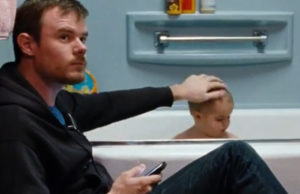 Jenny is the kind of upsetting force that will bring family issues to the fore. Everyone loves her, including the baby, but she occasionally self-medicates in dangerous ways, dangerous for her and for people around her.
Jenny is the kind of upsetting force that will bring family issues to the fore. Everyone loves her, including the baby, but she occasionally self-medicates in dangerous ways, dangerous for her and for people around her. Jeff and Kelly can’t undo their parenthood, but they can express their feelings about this moment, and with sympathetic hearts motivated by (I’m interpreting here) basic goodness, try to reconcile conflicting needs. Whether Jenny makes it happen for them, whether they all make it happen for each other, and whether they’ll continue to do so is irrelevant to this movie, something that may disappoint many viewers who expect cinematic closure. The fact that they are doing it in the moment, and that we can see how it happens, is what matters, and this is what makes Happy Christmas beautiful.
Jeff and Kelly can’t undo their parenthood, but they can express their feelings about this moment, and with sympathetic hearts motivated by (I’m interpreting here) basic goodness, try to reconcile conflicting needs. Whether Jenny makes it happen for them, whether they all make it happen for each other, and whether they’ll continue to do so is irrelevant to this movie, something that may disappoint many viewers who expect cinematic closure. The fact that they are doing it in the moment, and that we can see how it happens, is what matters, and this is what makes Happy Christmas beautiful. I had pretty low expectations going into Bohemian Rhapsody. I worried that it would overly prettify Queen’s surviving members’ stories or overly dramatize Freddy Mercury’s sexual preferences and his related death. There was plenty of the former, and not too much of the latter, and since there’s a decent amount of emphasis on the music itself, the movie feels pretty good.
I had pretty low expectations going into Bohemian Rhapsody. I worried that it would overly prettify Queen’s surviving members’ stories or overly dramatize Freddy Mercury’s sexual preferences and his related death. There was plenty of the former, and not too much of the latter, and since there’s a decent amount of emphasis on the music itself, the movie feels pretty good.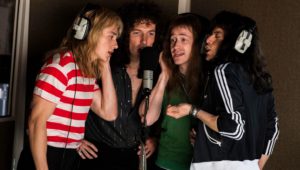 The movie follows the biopic formula, and I suppose that’s a good thing. For those of us unfamiliar with the band’s origins and its musical ambitions, it’s enlightening to see how members of the band worked together to create the sound and feel of their music, how (for example) A Night at the Opera began with the concept of rock and roll performed with the scope, scale, and aspirations of opera, and how the band moved into a farm for the recording sessions.
The movie follows the biopic formula, and I suppose that’s a good thing. For those of us unfamiliar with the band’s origins and its musical ambitions, it’s enlightening to see how members of the band worked together to create the sound and feel of their music, how (for example) A Night at the Opera began with the concept of rock and roll performed with the scope, scale, and aspirations of opera, and how the band moved into a farm for the recording sessions. One recurring theme is that Queen was a band. In one early scene, an interviewer begins a question with, “As the leader of Queen—” only to be cut off quickly and sharply by Mercury, who insists, “I am not the leader of Queen; I am only the lead singer.” Other scenes show individual creative contributions by bassist John Deacon, drummer Roger Taylor, and guitarist Brian May. For a rock and roll geek like me, this is the good stuff, if the content can be believed.
One recurring theme is that Queen was a band. In one early scene, an interviewer begins a question with, “As the leader of Queen—” only to be cut off quickly and sharply by Mercury, who insists, “I am not the leader of Queen; I am only the lead singer.” Other scenes show individual creative contributions by bassist John Deacon, drummer Roger Taylor, and guitarist Brian May. For a rock and roll geek like me, this is the good stuff, if the content can be believed. The band takes several such moments to demonstrate how rock and roll it was, how Queen wasn’t just Freddie Mercury and some guys, and how its members always knew what they wanted. The overall feel is horribly manufactured as if to present Queen in its best possible light.
The band takes several such moments to demonstrate how rock and roll it was, how Queen wasn’t just Freddie Mercury and some guys, and how its members always knew what they wanted. The overall feel is horribly manufactured as if to present Queen in its best possible light. It was difficult to ignore the trailer for Welcome to Marwen. It promised Steve Carell in his best, outsider mode, which I’ll sign up for every time. Robert Zemeckis is always a coin toss for me, but he did make several films I like very much (I have not joined the anti-chorus of haters for Forrest Gump ,a movie I still love) so I try to set my sights low before sitting down with my Junior Mints. In some ways my expectations were greatly exceeded. In a few ways they were a bit too high.
It was difficult to ignore the trailer for Welcome to Marwen. It promised Steve Carell in his best, outsider mode, which I’ll sign up for every time. Robert Zemeckis is always a coin toss for me, but he did make several films I like very much (I have not joined the anti-chorus of haters for Forrest Gump ,a movie I still love) so I try to set my sights low before sitting down with my Junior Mints. In some ways my expectations were greatly exceeded. In a few ways they were a bit too high.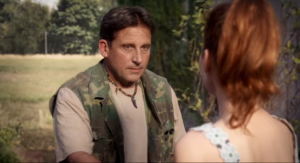 Carell plays Mark Hogancamp. We meet him three years removed from a vicious beating that wiped all his memories away. Suffering from extreme PTSD, Mark has learned to deal with his demons by creating a small, WWII-era Belgian town named Marwen. Marwen is populated by a G.I. Joe kind of doll who looks like Mark and is named after Mark, plus a half dozen beautiful women dolls, all counterparts of women in Mark’s real life.
Carell plays Mark Hogancamp. We meet him three years removed from a vicious beating that wiped all his memories away. Suffering from extreme PTSD, Mark has learned to deal with his demons by creating a small, WWII-era Belgian town named Marwen. Marwen is populated by a G.I. Joe kind of doll who looks like Mark and is named after Mark, plus a half dozen beautiful women dolls, all counterparts of women in Mark’s real life. The setup is pretty creepy, but there’s some novelty here that make the premise itself mostly work. Most of the credit goes to Carell’s strong, tortured performance, Zemeckis’s audacity, and sympathetic supporting characters who indulge Mark’s eccentricities while keeping him anchored in the real world.
The setup is pretty creepy, but there’s some novelty here that make the premise itself mostly work. Most of the credit goes to Carell’s strong, tortured performance, Zemeckis’s audacity, and sympathetic supporting characters who indulge Mark’s eccentricities while keeping him anchored in the real world. Like most metaphors taken too far, Marwen gets cheesy, forced, and ridiculous. Mark is surrounded by people reaching out to him with genuine, human touch, and while it’s fully understandable that he would retreat further into his pretend world as his real world becomes increasingly stressful (in its most brutal sense), by now we get the picture and would much rather see the story from his real friends’ real perspectives.
Like most metaphors taken too far, Marwen gets cheesy, forced, and ridiculous. Mark is surrounded by people reaching out to him with genuine, human touch, and while it’s fully understandable that he would retreat further into his pretend world as his real world becomes increasingly stressful (in its most brutal sense), by now we get the picture and would much rather see the story from his real friends’ real perspectives. There’s a lot to spoil about Spider-Man: Into the Spider-Verse, so what I’ll say here will not tell you much about it. Still, I think it’s safe to offer a few thoughts in the interest of convincing you it’s worth checking out.
There’s a lot to spoil about Spider-Man: Into the Spider-Verse, so what I’ll say here will not tell you much about it. Still, I think it’s safe to offer a few thoughts in the interest of convincing you it’s worth checking out. The story may sound like typical teen-angst fodder but it stands out because of what’s going on as the film tells it: multiculturalism, hyper-surreal visuals, and plenty of humor. I can’t believe the filmmakers get away with some of their bizarre decisions, but they get away with them all because once the movie establishes itself as a story where anything can happen, anything happens.
The story may sound like typical teen-angst fodder but it stands out because of what’s going on as the film tells it: multiculturalism, hyper-surreal visuals, and plenty of humor. I can’t believe the filmmakers get away with some of their bizarre decisions, but they get away with them all because once the movie establishes itself as a story where anything can happen, anything happens.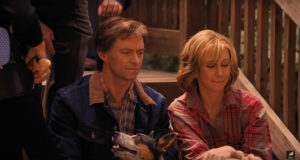 The Front Runner is Jason Reitman’s film about the candidacy of Gary Hart for the 1988 presidential election. There are a lot of approaches a filmmaker could take for a picture like this. It’s the rise and fall of an intellectual, good-looking senator. It’s the victimization of a young model aspiring to a career in government. It’s the turning point in our national discourse where a politician’s personal life becomes relevant for American voters. Or it’s the moment when American journalists stopped turning a blind eye to politicians’ dalliances and actively reported on them.
The Front Runner is Jason Reitman’s film about the candidacy of Gary Hart for the 1988 presidential election. There are a lot of approaches a filmmaker could take for a picture like this. It’s the rise and fall of an intellectual, good-looking senator. It’s the victimization of a young model aspiring to a career in government. It’s the turning point in our national discourse where a politician’s personal life becomes relevant for American voters. Or it’s the moment when American journalists stopped turning a blind eye to politicians’ dalliances and actively reported on them.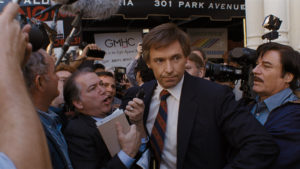 Reitman hits that last one, with dramatizations of conversations between publishers, editors, and reporters at the Washington Post and Miami Herald. The decision to pursue a story about Hart’s relationship with his alleged mistress Donna Rice is nothing shy of an identity crisis for everyone involved and for the institution of journalism.
Reitman hits that last one, with dramatizations of conversations between publishers, editors, and reporters at the Washington Post and Miami Herald. The decision to pursue a story about Hart’s relationship with his alleged mistress Donna Rice is nothing shy of an identity crisis for everyone involved and for the institution of journalism. I was confused and annoyed by the director’s decisions in the first half of the film. Some reviewers have called the overlapping dialogue, quick edits, and enormous number of characters Altmanesque, but I’ve never been this confused by an Altman movie. As the film progresses, a few key characters emerge (notably A.J. Parker, a fictional Washington Post reporter played by Mamadou Athie), and the movie becomes a lot less chaotic. I want to see this again to decide if I simply got used to the style or if Reitman deliberately creates an experience that becomes less confusing as the story progresses.
I was confused and annoyed by the director’s decisions in the first half of the film. Some reviewers have called the overlapping dialogue, quick edits, and enormous number of characters Altmanesque, but I’ve never been this confused by an Altman movie. As the film progresses, a few key characters emerge (notably A.J. Parker, a fictional Washington Post reporter played by Mamadou Athie), and the movie becomes a lot less chaotic. I want to see this again to decide if I simply got used to the style or if Reitman deliberately creates an experience that becomes less confusing as the story progresses. Hugh Jackman is excellent as Hart, and Vera Farmiga, as always, is terrific as well, playing Hart’s wife Lee. I’d never heard of Molly Ephraim, who plays a fictional Hart campaign scheduler and kind of Donna Rice’s handler when things get hot, but she’s an interesting actress in kind of a challenging role.
Hugh Jackman is excellent as Hart, and Vera Farmiga, as always, is terrific as well, playing Hart’s wife Lee. I’d never heard of Molly Ephraim, who plays a fictional Hart campaign scheduler and kind of Donna Rice’s handler when things get hot, but she’s an interesting actress in kind of a challenging role.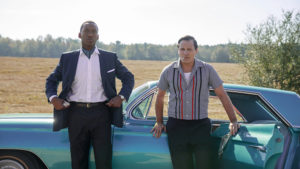 The Green Book, I learned early this year, was a directory published in the United States between the 1930 and 1960s, and listed businesses friendly to African Americans. Michael Wilbon, whose parents were from the South, said they didn’t travel home from Chicago without it. I’m disappointed in myself for not being aware of it, but it’s something that kind of hints at why a movie like this still needs to be made in 2018, and it excuses the film’s one major flaw.
The Green Book, I learned early this year, was a directory published in the United States between the 1930 and 1960s, and listed businesses friendly to African Americans. Michael Wilbon, whose parents were from the South, said they didn’t travel home from Chicago without it. I’m disappointed in myself for not being aware of it, but it’s something that kind of hints at why a movie like this still needs to be made in 2018, and it excuses the film’s one major flaw. Mahershala Ali plays pianist Don Shirley, who embarks on a tour of the Midwest and South with the other musicians in his trio, a white bass player and a white violinist. The record company insists he hire a white driver, someone who can keep trouble away from Shirley on the tour. Viggo Mortensen plays Frank Vallelonga, “Tony Lip” to his friends and associates. He’s pretty much a mob-connected goombah whose work history includes “taking care of problems.”
Mahershala Ali plays pianist Don Shirley, who embarks on a tour of the Midwest and South with the other musicians in his trio, a white bass player and a white violinist. The record company insists he hire a white driver, someone who can keep trouble away from Shirley on the tour. Viggo Mortensen plays Frank Vallelonga, “Tony Lip” to his friends and associates. He’s pretty much a mob-connected goombah whose work history includes “taking care of problems.”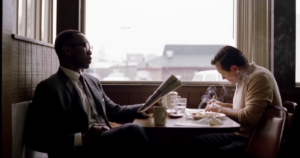 Much of the plot here is predictable in events and tone. If you’re thinking what I thought when I saw the trailer, that this is kind of a reverse Driving Miss Daisy, you’re not too far off, and this is the flaw. “Pandering,” “condescending,” and “preachy” came to mind as I tried to figure out my feelings midway through the movie, but none of them really hit the mark. Later, I heard someone refer to it as kind of an After School Special, and that’s it. It feels like it exists to teach me a life lesson.
Much of the plot here is predictable in events and tone. If you’re thinking what I thought when I saw the trailer, that this is kind of a reverse Driving Miss Daisy, you’re not too far off, and this is the flaw. “Pandering,” “condescending,” and “preachy” came to mind as I tried to figure out my feelings midway through the movie, but none of them really hit the mark. Later, I heard someone refer to it as kind of an After School Special, and that’s it. It feels like it exists to teach me a life lesson.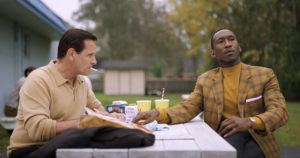 What really redeems the film is the fantastic acting by Ali and Mortensen. Each is completely unrecognizable, painting his character with a fine brush, as compared to the sledgehammer offered by much of the plot. There is one heavy-handed Don Shirley monologue that in a lesser actor’s hands could be groan-inducing, but is instead heartbreaking. Shoot, even someone like Denzel Washington, who is by no means a lesser actor, would likely elicit groans here. Instead, Ali presents a lifetime of vulnerability and alienation in a short minute to his tough-guy companion and it’s an amazing thing to see.
What really redeems the film is the fantastic acting by Ali and Mortensen. Each is completely unrecognizable, painting his character with a fine brush, as compared to the sledgehammer offered by much of the plot. There is one heavy-handed Don Shirley monologue that in a lesser actor’s hands could be groan-inducing, but is instead heartbreaking. Shoot, even someone like Denzel Washington, who is by no means a lesser actor, would likely elicit groans here. Instead, Ali presents a lifetime of vulnerability and alienation in a short minute to his tough-guy companion and it’s an amazing thing to see.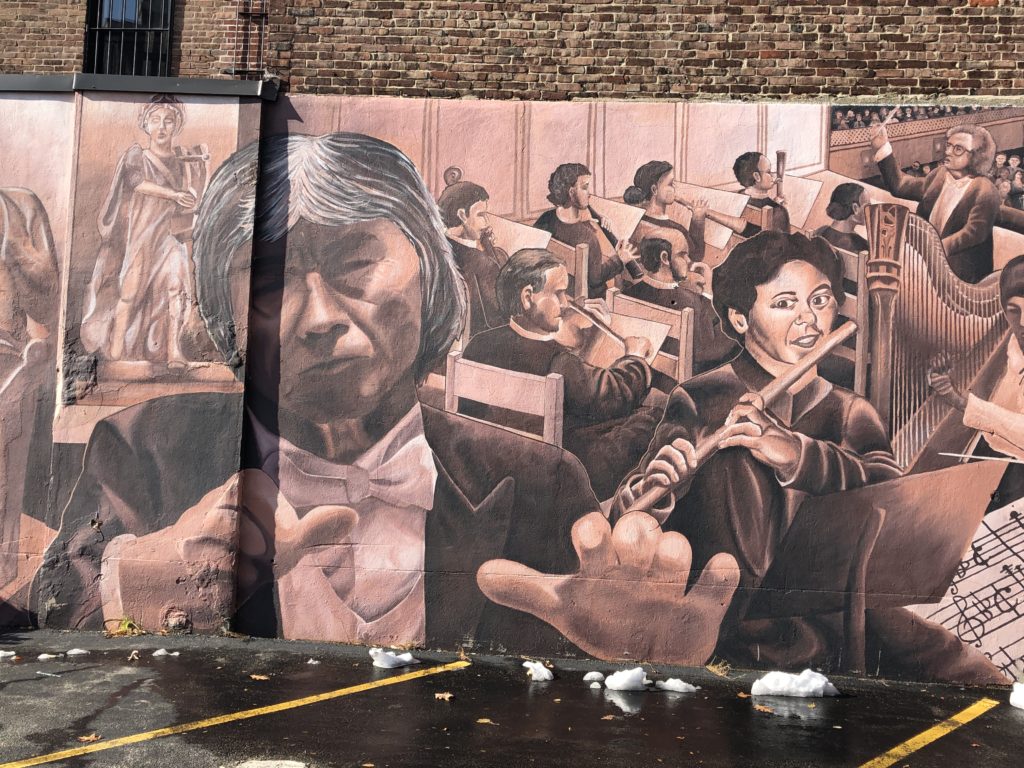

 It was seventeen years between Janet Gaynor and Judy Garland, twenty-two years between Garland and Barbra Streisand, and now forty-two years between Streisand and Lady Gaga as the titular star in A Star is Born. I mention this only because I’m thinking about the disconnect I felt with the music in the 1954 version and about how much I enjoyed the music in this 2018 version. Some stories deserve to be retold in ways that connect to their intended audiences, and maybe this is one.
It was seventeen years between Janet Gaynor and Judy Garland, twenty-two years between Garland and Barbra Streisand, and now forty-two years between Streisand and Lady Gaga as the titular star in A Star is Born. I mention this only because I’m thinking about the disconnect I felt with the music in the 1954 version and about how much I enjoyed the music in this 2018 version. Some stories deserve to be retold in ways that connect to their intended audiences, and maybe this is one. Some people say once a film has achieved cultural icon status, there’s no point in remaking it, but I’m not one of these people. Art is consumed, but it is also created, and its creation is most often where the magic and beauty are, and if we didn’t all feel this way we would be stuck with one interpretation of Romeo and Juliet and one version of “All Along the Watchtower.” The world would be a poorer place.
Some people say once a film has achieved cultural icon status, there’s no point in remaking it, but I’m not one of these people. Art is consumed, but it is also created, and its creation is most often where the magic and beauty are, and if we didn’t all feel this way we would be stuck with one interpretation of Romeo and Juliet and one version of “All Along the Watchtower.” The world would be a poorer place. More important, Gaga and Cooper have something different to say in this telling of the tale. There was a hint of a statement in the 1976 film about rock music and pop, but here it seems to be the central theme. This movie is less about a relationship, less about self-destructive personalities, and more about music and success. This may also be its biggest shortcoming, but the shift in emphasis validates a third remake.
More important, Gaga and Cooper have something different to say in this telling of the tale. There was a hint of a statement in the 1976 film about rock music and pop, but here it seems to be the central theme. This movie is less about a relationship, less about self-destructive personalities, and more about music and success. This may also be its biggest shortcoming, but the shift in emphasis validates a third remake. Our falling star is now named Jackson Maine and our rising star is Ally Campana, and their meeting is very much like Esther’s meeting John in 1976. Ally’s singing in a drag show when a drunk Jackson stumbles in. Their connection is nearly immediate, and they get to know each other very quickly. Before they’ve been acquainted 48 hours, Jackson practically forces Ally onstage to perform one of her songs. She’s an immediate hit.
Our falling star is now named Jackson Maine and our rising star is Ally Campana, and their meeting is very much like Esther’s meeting John in 1976. Ally’s singing in a drag show when a drunk Jackson stumbles in. Their connection is nearly immediate, and they get to know each other very quickly. Before they’ve been acquainted 48 hours, Jackson practically forces Ally onstage to perform one of her songs. She’s an immediate hit. Ally on stage is likeable, but her pop music feels fake, and if that weren’t blatant enough a statement, there’s a moment where Jackson offers her a pep talk, saying her audiences will love her if she always effing means what she’s singing.
Ally on stage is likeable, but her pop music feels fake, and if that weren’t blatant enough a statement, there’s a moment where Jackson offers her a pep talk, saying her audiences will love her if she always effing means what she’s singing.